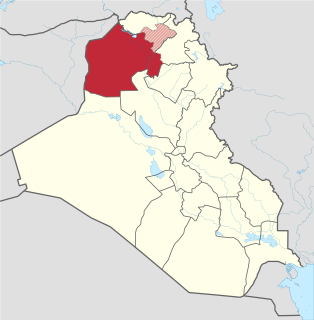The politics of Iraq take place in a framework of a federal parliamentary representative democratic republic. It is a multi-party system whereby the executive power is exercised by the Prime Minister of the Council of Ministers as the head of government, as well as the President of Iraq, and legislative power is vested in the Council of Representatives and the Federation Council.

Nineveh Governorate is a governorate in northern Iraq that contains the ancient Assyrian city of Nineveh. It was an integral part of Assyria from the 25th century BC to the 7th century AD. It has an area of 37,323 km2 (14,410 sq mi) and an estimated population of 2,453,000 people in 2003. Its chief city and provincial capital is Mosul, which lies across the Tigris river from the ruins of ancient Nineveh. Tal Afar is the second-biggest city. Before 1976, it was called Mosul Province and included the present-day Dohuk Governorate, which is now part of the autonomous Iraqi Kurdistan.

Elections for the National Assembly of Iraq were held on January 30, 2005 in Iraq. The 275-member National Assembly was a parliament created under the Transitional Law during the Occupation of Iraq. The newly elected transitional Assembly was given a mandate to write the new and permanent Constitution of Iraq and exercised legislative functions until the new Constitution came into effect, and resulted in the formation of the Iraqi Transitional Government.
The Independent High Electoral Commission is Iraq's electoral commission. The electoral commission is headed by a nine-member board. Seven of those members are voting and must be Iraqi citizens. The other two members are the Chief Electoral Officer and an outside expert appointed by the United Nations.

Governorate or provincial elections were held in Iraq on 31 January 2009, to replace the local councils in fourteen of the eighteen governorates of Iraq that were elected in the Iraqi governorate elections of 2005. 14,431 candidates - including 3,912 women - contested 440 seats. The candidates came from over 400 parties - 75% of which were newly formed.

A parliamentary election was held in Iraq on 7 March 2010. The election decided the 325 members of the Council of Representatives of Iraq who would elect the Iraqi prime minister and president. The election resulted in a partial victory for the Iraqi National Movement, led by former Interim Prime Minister Ayad Allawi, which won a total of 91 seats, making it the largest alliance in the Council. The State of Law Coalition, led by incumbent Prime Minister Nouri Al-Maliki, was the second largest grouping with 89 seats.
The Al Muthanna governorate election of 2009 was held on 31 January 2009 alongside elections for all other governorates outside Iraqi Kurdistan and Kirkuk.

The State of Law Coalition also known as Rule of Law Coalition is an Iraqi political coalition formed for the Iraqi governorate elections, 2009 by the Prime Minister of Iraq at the time, Nouri al-Maliki, of the Islamic Dawa Party.

Assyrian politics in Iraq have been taking many different turns since the US invasion of Iraq in 2003. Today, there are many different Assyrian political parties in Iraq. The main Assyrian party that came out from the 2005 elections was the Assyrian Democratic Movement. However, Sarkis Aghajan began to challenge its power beginning in 2006 with the opening of Ishtar TV and the KDP-affiliated Chaldean Syriac Assyrian Popular Council.

The National White Bloc, formerly known as the Iraqi National Movement Party or the White Iraqiya, is an Iraqi political party.

Governorate or provincial elections were held in Iraq on 20 April 2013, to replace the local councils in the governorates of Iraq that were elected in the Iraqi governorate elections of 2009. Elections took place in 12 of Iraq's 18 governorates. Elections didn't take place in the 3 governorates forming the Kurdistan Region or Kirkuk, Anbar, or Ninevah, meaning that a total of 378 provincial council seats were up for election.

The Iraqi Kurdistan legislative elections of 2013 took place on 21 September 2013. It was the fourth legislative election in Iraqi Kurdistan since 1992. The candidates were competing for a total of 111 seats out of which 11 seats were reserved for minorities. According to the Iraqi High Electoral Commission, there were 366 female and 736 male candidates for the elections. A total of 2,653,743 people were eligible to vote throughout the three provinces of Erbil, Sulaymaniyah and Dohuk of which 74% cast their ballots.
The Al Anbar governorate election of 2013 was held on 20 June 2013 alongside elections for Ninevah.

The 2013 Nineveh Governorate election in Iraq was held on 20 June with elections for the Al Anbar Governorate. Due to security problems, turnout was less than half that of the 2009 election. This election saw Sunni Arab parties lose a number of seats to minority parties.

Parliamentary elections were held in Iraq on 30 April 2014. The elections decided the 328 members of the Council of Representatives who will in turn elect the Iraqi President and Prime Minister.
The Iraqi Kurdistan Governorate elections were held on 30 April 2014. The elections for the three Kurdish governorates coincided with the elections for Iraqi parliament.

Citizen Alliance is a political coalition in Iraq led by Ammar al-Hakim, President of the Islamic Supreme Council of Iraq, from 2014 to 2017. Most of its MPs joined the National Wisdom Movement when this new party was launched in 2017 by Ammar al-Hakim.

Parliamentary elections were held in Iraq on 12 May 2018. The elections decided the 329 members of the Council of Representatives, the country's unicameral legislature, who in turn will elect the Iraqi President and Prime Minister. The Iraqi parliament ordered a manual recount of the results on 6 June 2018. On 10 June 2018, a storage site housing roughly half of the ballots from the May parliamentary election caught fire.
















